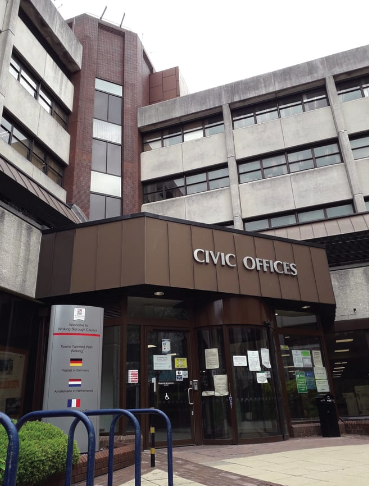The way in which bankrupt Woking Borough Council navigates through its £2 billion debt will determine the future of services in the area.
How it does this remains to be seen. Whether it's the “difficult decisions” that need to be made, or the “constantly changing” financial landscape, the state of Woking Borough Council’s historic debt means remains opaque.
The first real indications on the direction of travel for residents and services in Woking will begin to emerge after an extraordinary meeting of the council – scheduled for June 20 when an emergency budget will be discussed.
It comes after the council issued a section 114 notice on Wednesday June 7 banning all new spending on anything outside its statutory obligations.
To help understand how the council got where it is, and what options it has, we spoke with three key figures: current deputy leader of the council, Will Forster; current Conservative Party councillor who was part of the ruling group during the 2016-2019 period when many of the fateful decisions were taken, Kevin Davis; and the former Woking Conservative deputy leader and portfolio holder responsible for finance, Simon Ashall.

Cllr Will Forster, the Liberal Democrat deputy leader of the council, said: “Difficult decisions need to be made and day-to-day spending could be managed but the debt is just an unsolvable local problem.
“Raising taxes and cutting services is not the answer.
“Even if you raised council tax by 15 per cent and cut every non statutory service the council still couldn’t cope.”
Asked about speculation that a bailout could impact national budgets – and even potentially interest rates, he said: “If the government is going to step in and support the council to the full £1bn, it’s quite sizeable and their finances need to be adjusted, but clearly they have to as the council can’t fund it."
On what comes next he said: “We don’t know. The Lib Dems are going to have to make some very tough decisions that we don’t want to make but we need to.
“But, the problem isn’t solvable locally – that’s how bad the situation is.”
He said it is likely the council will continue borrowing as that was the business model it was under citing the development in Sheerwater and despite the optics of how bad it look to borrow – “you need to finish the regeneration, you can’t just leave homes half built”.
Councillor Kevin Davis has been a Conservative councillor since 2012, serving as a backbencher when much of the decisions that have come home to roost took place.
Between 2016 and 2018 the council borrowed more than £750m to redevelop Victoria Square and Sheerwater.
He said: “The situation is changing almost daily.
“There have already been three briefings since the section 114 notice was issued.
“There are seven or eight councillors left that were involved in the Victoria Place and Sheerwater regeneration initial stages – and five voted for it.
“There are now more Lib Dems left on the council who voted for Victoria Place than any other party – and there are minutes that show the involvement of Lib Dems.”

Asked about whether he felt there was too much concentration of power at the top of the council between 2016-19 and whether all councillors had the full details to hand, he said: “It’s difficult to know to what extent what was known.
“What has come out is the information presented to us at the time, to make a sound decision, may not have been as sound as we thought.
“To what extent that [was ] we don’t know.”
He said there were going to be further examinations “almost forensic” into the council’s finances.
Decisions at the time were made in a “piecemeal fashion rather than based on a coordinated strategy”.
“There was a view of where we wanted the town to go,” he said, which started with the acquisition of tower blocks that had potential to have strategic options.
But when it came to the financial strategy, the planning was very piecemeal, he added, adding the financial details that are being unpicked now weren’t in the papers presented to councillors to vote on.
In 2018, the council stopped being scored by the financial ratings agency Moody’s which he said, should have set off alarm bells.
“We were told we could save money by not having that rating but (looking back) it was a clear signal," continued Cllr Davis.
“Overall it’s really frustrating, we didn’t know what we didn’t know."
“You make decisions with good intentions with the information you’ve got,” but, he said, they were not given the full picture.
On the political fallout locally, Cllr Davis said: “The impact on the residents of Woking, there will be some, but at this stage it’s all speculation. It’s really inappropriate for councillors to be discussing it in public”, adding “don’t scare residents”.
“Some residents think they have got to pay the debt and that’s on councillors who are hell bent on their own election campaigns rather than what is right or wrong and I find that disgusting and that has been going on in the last two years.
“We don’t know and we won’t know until June 20 what the initial impact will be on residents.
“Anything prior to that is speculation.”
Former Conservative councillor Simon Ashall, was the deputy leader and finance lead at Woking Borough Council. A position he held between 2020 and 2022 after many of the key decisions were taken.
As part of the leadership team he and others appointed a new CEO to take over the running of the council.
He said: “There were always people who felt there was a (level) which the council shouldn’t go.
“In 2020 it was at about £1.8 billion – which is an awful lot of money. We asked questions and I had lots of questions for senior officers
“You have to take the advice of strategic officers and take regard to what they are telling you.”
He said at the time from both a legal and financial perspective there was nothing coming back that anything was wrong.
He said: “The intention for all of this, going back to before I was elected, was to create a better social and economic infrastructure for ordinary people. It wasn’t to fund developers.
“You look at it now and you think ‘my god’, but at the time we were told the capacity to fund it was there.
“The government appears to have shifted position but at the time you were encouraged to come forward with proposals to transform your town.
“Woking was at one point paying for a huge amount of discretionary services. You could say now it was built on shifting sands but not at the time.
“We got the reports, we read them and made the decisions.”
Asked if, after taking on a leadership role, did councillors consider changing direction, he said: “We were so far along the journey that our choices were limited when making a radical departure throws everything into jeopardy.”
This is a point born out in an independent report on the council to the Department of Levelling up, Housing, and Communities, that said the council should continue to borrow £100m a year for the next three years to continue funding regeneration – as it was less risky than simply abandoning ship.
Mr Ashall said: “When we came in in 2020 we knew things had to change.”
He said the financial projections were based over a 50 year period and at the time the decisions were made it showed a £220million surplus over the life of the project.
He added: “These were projections that were being updated every three months.
“Are you going to end the project on that basis?
“It was showing as short-term turbulence but was still showing long term returns of £220m.”
He added: “The key to all this is to try to find some way out of this.”
By Chris Caulfiield
Local Democracy Reporting Service




